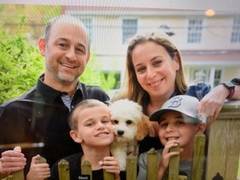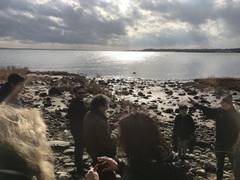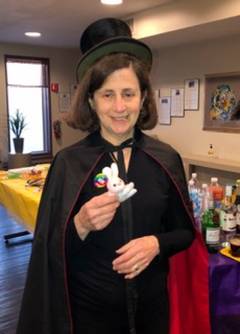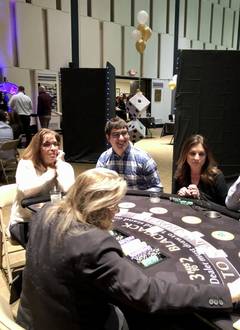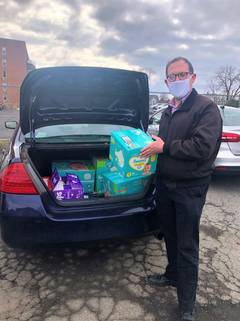Mattot 5779: Family Ties
08/09/2019 03:03:42 PM
Aug9
| Author | |
| Date Added | |
| Automatically create summary | |
| Summary |
I had the great pleasure a few months ago of reading this recent book, The Soul of the Stranger, by Joy Ladin. Joy Ladin is transgender; she was raised as a boy and as an adult came to realize and express her true identity as a woman, an excruciating process that upended her life and that of her family. Nonetheless, she was able to keep her job as an English professor at Stern College of Yeshiva University, making her the first openly transgender employee of an Orthodox institution.
In this recent book, subtitled Reading God and Torah From a Transgender Perspective, Ladin draws on her experience of being transgender to offer gorgeous, fresh understandings of passages from the Torah. The book brings together two foundational aspects of her life. She writes, “For as long as I can remember, I felt that I was female, and for long as I can remember, I have sensed God's presence” (1).
What was most refreshing to me about Ladin's book is her unapologetic account of her own spiritual experiences and connection with God, something that is sorely lacking in much contemporary Jewish discourse. Looking at the Torah through her slice of the human experience brings forward aspects of the Torah that we might otherwise overlook. Tonight, I wanted to bring one such interpretation from one of this week's Torah readings, Mattot.
The Torah reading begins with the laws concerning vows. Vows and oaths were promises a person made in the name of God, often in a moment of crisis, to dedicate something to the sanctuary or to abstain from something in particular. These vows were considered extremely serious, in which people, by their own choice, make something that is otherwise permitted to them, like wine, prohibited. An entire tractate of the Talmud is dedicated to such vows and their retroactive annulment. A remnant of this concern for the consequences of unfulfilled vows can be found in the Kol Nidre, the All Vows, prayer that opens Yom Kippur.
The Torah quickly turns to the status of vows made by women. Reflecting the patriarchal assumptions of its time, the Torah addresses the cases of a young woman still living in her father's household, of a woman who made a vow prior to marriage, and of a woman who is already married at the time of the vow. In each case, the Torah provides a one-day window in which that woman's father or husband can annul her vow. But once that one-day window closes, the woman's vow remains in force. Only the vows of a divorced or widowed woman are not subject to any man's veto. Yet, even that limited veto power maintains the woman's basic right to make a vow in the first place.
The Talmud and later Jewish tradition, and contemporary Jewish thinkers all the more so, find these laws difficult to reckon with any notion of gender equality. Even the Talmudic rabbis significantly limit the applicability of these laws.
But Joy Ladin sees something else entirely in this passage: a model of how to handle the conflict between an individual's self-determination and the individual's responsibility to family.
Ladin experienced such a conflict during her gender transition. Married with children, her family struggled to understand the person she was becoming, how things had gotten to the point where she could no longer go on under her male identity. It led to a divorce and estrangement that was painful and confusing for all parties.
During this struggle, Ladin encountered two contradictory approaches to this problem. One, from supporters of transgender rights, argued that people's right to determine their own identities overrode any concern about how that determination would impact their families. Opponents said the opposite: that transgender people must be willing to sacrifice themselves, to continue to live as the person everyone assumed them to be, for the sake of their families.
But as Ladin writes, “none of these voices acknowledged that I, as a transgender person who was also a husband and father, could neither ignore my family's needs nor continue to erase myself for their sakes. None of them could help me think through the devastating choice between being true to myself and being true to those I loved”(111).
Ladin sees in these antiquated laws about vows a model for mediating this conflict. In its own matter-of-fact way, the Torah imagines a situation where a woman wants to commit herself to living a certain way, even as her family has other ideas. These laws do not categorically choose one party over the other. Rather, these laws “recognize, protect and limit both patriarchal authority and women's power of self-determination” (112). Consider the alternatives: the Torah could have totally forbidden women from vowing, or given her family no say in the matter. Instead, the Torah presents a compromise position.
Such a compromise position is what Ladin longed for in her own encounter with her family. This model, that honors both the needs of the individual and the family, “would not,” Ladin writes, “have resolved the conflict that tore my family apart, but it could have helped us understand it, discuss it, and seek our own version of the kind of compromise…that is pragmatic rather than moralistic, that seeks a mutually respectful give-and-take rather than surrender” (112).
While they might be less dramatic than Ladin's, we may find ourselves in a similar situation of conflict between the people we feel compelled to be and the expectations of our families. Choices of career or marriage partner may conflict with parental expectations. How we choose to spend our time may conflict with the needs and desires of a spouse.
The laws of vowing, in their own way, point towards a compromise position, where neither party completely yields to the other, but instead together find some middle ground that acknowledges the rights and needs of each. Finding such compromises is not easy, but they are essential for holding together a family. May we be blessed with the ability to find and to accept them. Shabbat Shalom.
Fri, October 31 2025
9 Cheshvan 5786
Photo Gallery
Photo Albums
Fri, October 31 2025 9 Cheshvan 5786
Upcoming Events
All Events
-
Saturday ,
NovNovember 1 , 2025Dror Israel Shabbat
Shabbat, Nov 1st 11:30a
Dror Israel Shabbat Dror Israel’s Mirit Sulema, along with two leaders of the Arab Youth Movement NOAL, Tal Tunik and Shadi Habiballa, will speak during a Kiddush lunch about their important work with Arab Israeli youth and bringing Jewish, Arab, and Druze youth together. Saturday, November 1st, approx. 11:30am KTI Social Hall "We eat together, laugh together. We talk about what we think of each other, and what will help bring peace.” RSVP Appreciated -
Saturday ,
NovNovember 1 , 2025KTI Gala - A November to Remember Digital Journal
Motzei Shabbat, Nov 1st 7:00p to 10:00p
-
Saturday ,
NovNovember 1 , 2025KTI Gala - A November to Remember
Motzei Shabbat, Nov 1st 7:00p to 10:00p
Saturday, November 1, 2025, 7:00 PM - 10:00 PM Harrison Meadows -
Wednesday ,
NovNovember 5 , 2025Rabbi, May I? Modern Responsa
Wednesday, Nov 5th 10:00a to 11:30a
Wednesdays, 10 - 11:30 AM, KTI Library Ever since Abraham’s famous argument with God, Judaism has been full of debate. Moses and Korah, David and Nathan, Hillel and Shammai, the Vilna Gaon and the Ba’al Shem Tov, Spinoza and the Amsterdam Rabbis . . . the list goes on. No wonder that Judaism cherishes the expression machloket l’shem shamayim, “an argument for the sake of heaven.” Beyond their historical importance, what makes these disputations so compelling is that nearly all of them, regardless of their epochs, are still being argued. The parade of characters spanning three millennia of biblical, rabbinic, and modern disputation reflects the panorama of Jewish history with its monumental political, ethical, and spiritual challenges. This series will examine Jewish responses to exile from the biblical period to our modern day. Considering texts from all genres of Jewish literary creativity, we will explore how the realities and iterpretaions Join as we re-open these timeless debates that lead us to the core of 3,000 years of Jewish conversation. • Justice: Abraham vs. God (October 19) • Holiness and Authority: Moses vs. Korah (November 9) • Inclusion: The Five Daughters vs. the Twelve Tribes (November 30) • Accountability and Morality: David vs. Nathan (December 21) • Resistance: Ben Zakkai vs. the Zealots (January 18) • Law: Hillel vs. Shammai (February 15) • Spirituality: The Vilna Gaon vs. the Baal Shem Tov (March 15) • Boundaries: Spinoza vs. the Amsterdam Rabbis (April 19) • Religious Evolution: Geiger vs. Hirsch vs. Frankel (May 10) • Zionism: Herzl vs. Wise (May 31) -
Thursday ,
NovNovember 6 , 2025Coffee with the Rabbi
Thursday, Nov 6th 8:00a to 9:00a
Start your morning with some caffeine and casual or meaningful conversation! Join Rabbi Goldberg for a Coffee Chat! Stop by Rye Ridge Starbucks any of the following Thursdays, between 8-9am: June 12 and 26 July 10 and 24 August 7 and 21 September 4 and 18 October 16 and 30 November 6 and 20 December 4 and 18
Privacy Settings | Privacy Policy | Member Terms
©2025 All rights reserved. Find out more about ShulCloud

